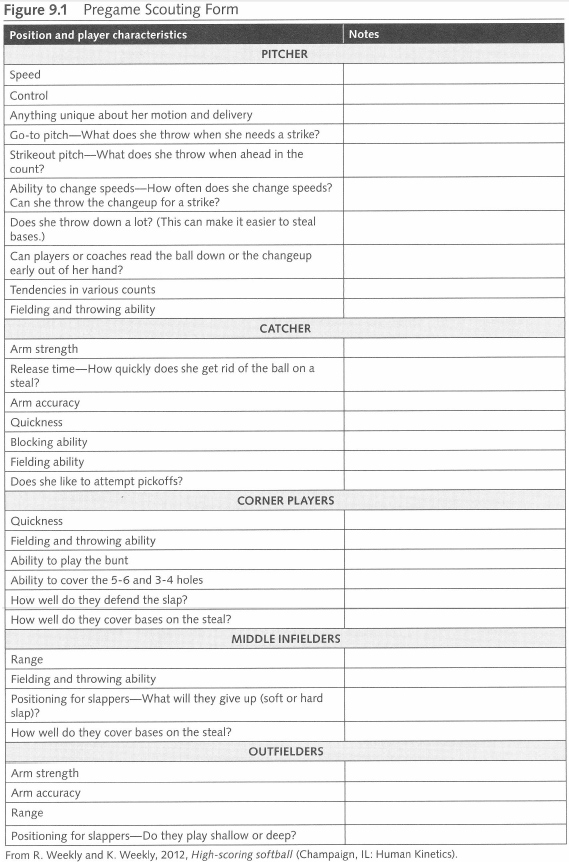| Pre-Game Scouting Report
Originally Pubished in: High-Scoring Softball - Ralph and Karen Weekly - Human Kinetics
When possible, coaches should scout their opponent and provide information to their team. When preparing the offense to face another team, coaches should learn specific information about the opponent's players at each position. Figure 9.1 provides a list of the information that coaches should try to obtain for the pregame scouting report. A coach's pregame scouting tasks should also include gathering information about the field conditions. Is the field hard or soft? This is important for the team's slappers to know. Is the field wet? If so, base runners should be more aggressive in taking extra bases, knowing that the outfielders will be handling a wet ball. How much distance is there from home plate to the backstop? This will dictate whether base runners on third base can score on a passed ball or wild pitch. How big is the foul territory? If it's extensive, runners may have an opportunity to tag and advance on a caught foul ball. How does the ball bounce off the backstop and off the outfield fence? This information will influence decisions made by base coaches and base runners. These are just some examples of the types of things that coaches should consider telling their team about the upcoming game. By no means will a coach share all of the listed information. With a pregame scouting report, a coach must be sure not to give the players too much information. The coach must also gauge which players need more or less information. Some players like a lot of information, and it helps them play with more confidence. Others will suffer from "information overload" and will think too much rather than play on instinct. Ultimately, players should be focused on their own performance and not the opponent. However, information can be advantageous if players use it to help them execute in a given situation. Typically, coaches look for a weakness that the team can exploit, and they make sure the players are aware of it. For example, an opposing pitcher may not be able to throw overhand well. In this case, coaches would tell their slappers to drag bunt to the pitcher and would have their right-handed hitters do the same in bunt situations. If the catcher is slow getting rid of the ball on steals, coaches may put runners in motion more often than they normally would.
Coaches may also talk to their team about how the opponent plays under pressure. A shortstop or outfielder may have a great arm and look fantastic during pregame warm-up, but this same player may have a tendency to throw the ball away in a pressure situation. Coaches may want their runners to know that they should challenge this player to make a play under pressure anytime they can.
|








